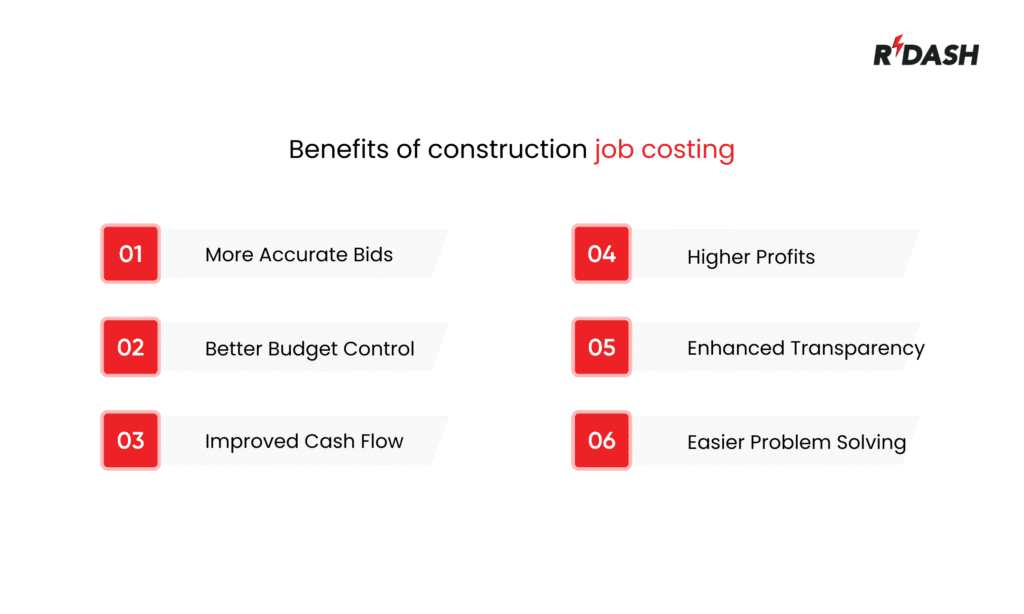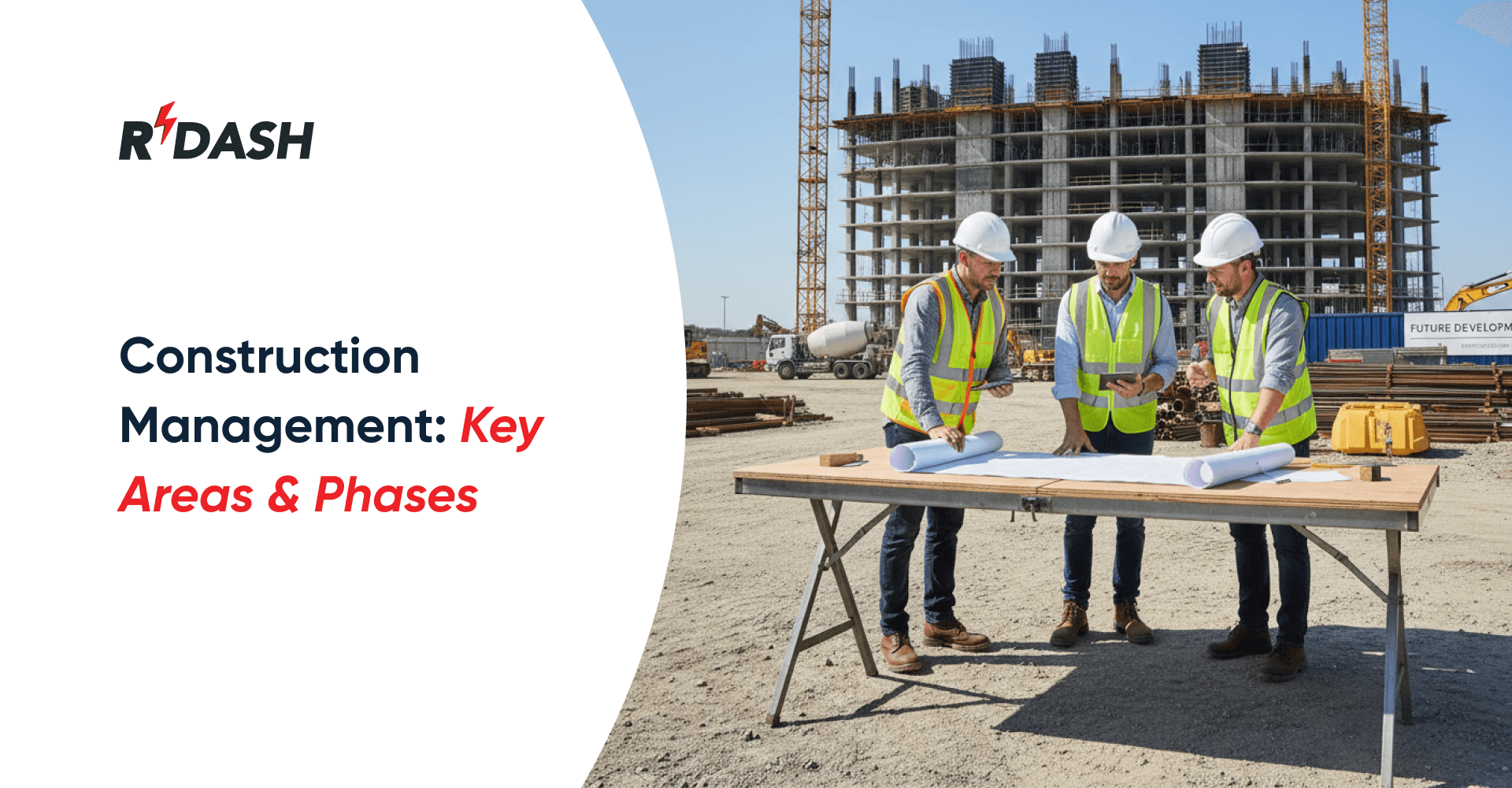What is construction job costing?
Construction job costing is a way for builders and contractors to track all the costs linked to a specific project. It’s like keeping a detailed record of everything spent on one job – such as a new house, office building, or road. This method helps construction companies know exactly how much each project costs, so they can understand which jobs are profitable and which are not.
Instead of lumping all expenses together, job costing breaks them down for each job. It records what was spent on materials, labor, equipment, subcontractors, and overhead for every project. By doing this, construction companies can better control spending, predict final costs, and make smarter decisions on future projects.
What should you include in construction job costing?
A good job costing process in construction includes all costs related to the project, big or small. Here’s what you need to track:
- Labor: This is money paid to workers and staff. Track the hours worked, pay rates, payroll taxes, overtime, and any benefits or insurance costs.
- Materials: Record the costs of wood, concrete, steel, and other items used in the project, plus delivery charges and small parts like screws or safety gear.
- Equipment: Include the cost of renting or owning machines, plus fuel, maintenance, and repairs.
- Subcontractors: If you hire electricians, plumbers, or other specialists, track exactly what you pay them.
- Overhead: Don’t forget indirect costs—like utilities, office expenses, permits, insurance, or project management fees. Some of these are tied to the project, and some are just part of keeping the business running.
- Committed Costs: These are expenses you have agreed to but haven’t paid yet – like an open contract, a signed purchase order, or work done but not invoiced.
Correct job costing means tracking every rupee spent, both directly and indirectly. This provides a true picture of your project expenses, helps avoid budget overruns, and keeps your business profitable.
Benefits of construction job costing
Construction job costing brings many advantages to contractors and project managers:

- More Accurate Bids: By tracking every cost on each job, you can create better estimates for future projects. This helps you avoid underbidding or losing profit because of overlooked expenses.
- Better Budget Control: Job costing lets you see where your money is going in real time. You can spot if a project is going over budget early and take action before it’s too late.
- Improved Cash Flow: When you know your exact costs and upcoming bills, you can manage payments to suppliers and workers smoothly, keeping your business stable.
- Higher Profits: By understanding what makes some jobs more profitable, you can focus on the right clients and avoid repeating costly mistakes in future work.
- Enhanced Transparency: Clients can see how their money is being spent, building trust and making it easier to answer any questions about project costs.
- Easier Problem Solving: When you see costs rising in one area, you can quickly spot the problem and fix it before it affects the whole project.
Tips to improve construction job costing
To get the most from job costing, follow these best practices:
- Track Everything: Record every expense – no matter how small. Missing costs can lead to inaccurate reports and lost profit.
- Use Cost Codes: Organize costs by type (like labor, materials, or equipment). Cost codes make it easier to review and compare projects.
- Update Costs Often: Don’t wait until a project ends to add expenses. Keep your records up to date so you always know your true costs.
- Use Technology: Job costing software can help you enter data accurately, view reports easily, and avoid human errors.
- Train Your Team: Make sure everyone understands how important job costing is and how to track costs properly.
- Review and Adjust: Regularly compare your projected costs and actual spending. Learn from each project to improve your estimates and processes for next time.

How construction job costing affects your business
Construction job costing has a big impact on your business, whether you run a small contracting firm or manage large-scale projects. Accurate job costing helps you:
- Control Budgets: By tracking costs for each job, you can avoid overspending and keep your projects on track financially.
- Increase Profits: Knowing your true expenses means you can price projects correctly, avoid costly mistakes, and improve your profit margins.
- Make Smart Decisions: Detailed cost data helps you spot waste, find areas for improvement, and decide which types of projects are best for your business.
- Build Trust with Clients: Transparent job costing lets you share detailed breakdowns of expenses, which builds trust and improves your reputation.
- Streamline Cash Flow: Monitoring job costs helps you plan payments, avoid cash shortages, and stay financially healthy throughout the project.
- Grow Your Business: With better insights, you can bid on more jobs confidently, manage multiple projects smoothly, and support long-term growth.
FAQs
What is construction job costing, in simple terms?
Construction job costing is the process of tracking every cost involved in a specific construction project, like materials, labor, equipment, and overhead.
Why is job costing important for contractors?
It helps contractors see where money is spent, avoid budget surprises, and keep their projects profitable.
What costs should be included in job costing?
All direct costs (labor, materials, equipment), payments to subcontractors, and indirect costs (overhead, insurance, permits).
How can job costing improve my bids?
With accurate cost data from past jobs, you can estimate future projects better and offer more competitive quotes.
Do I need special software for job costing?
Using job costing software makes tracking and reporting easier, reduces human error, and saves time compared to manual spreadsheets.
How often should I update job costing records?
Update records regularly throughout the project, not just at the end – to maintain accuracy and control spending.





